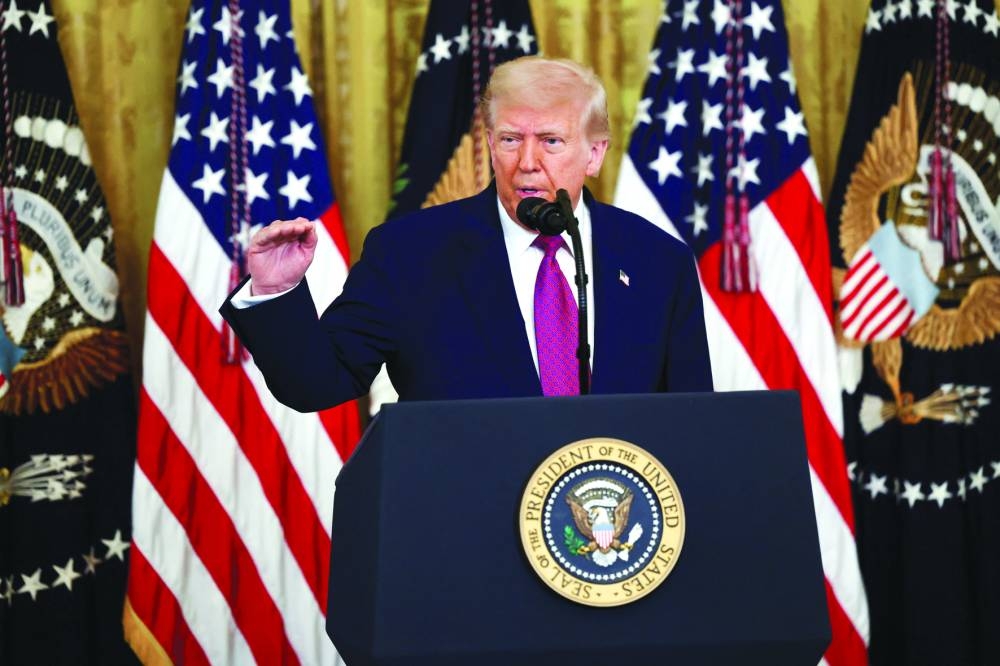The first pillar is America’s research institutions. During the Cold War, a bipartisan consensus supported ambitious programmes such as the Apollo programme and the Defense Advanced Research Projects Agency. Researchers and investigators enjoyed considerable intellectual autonomy. Seminal precursors to the modern internet – J C R Licklider’s concept of “interactive computing” and the ARPANET packet-switching network – originated within a deliberately loose federal/university lattice linking Stanford, MIT, the University of California at Berkeley, Columbia, and other campuses.
But the Trump administration’s spending cuts have undermined this model: the budgets for the National Science Foundation, Nasa’s science directorate, and the National Institutes of Health face reductions of 56%, nearly 50%, and about 40%, respectively. Such deep cuts, together with political litmus tests for research grants, will suffocate the ecosystem on which breakthrough discoveries depend.
The second, closely related pillar is talent. For more than two centuries, America’s greatest advantage has been its ability to attract people from around the world. In the nineteenth century, Samuel Slater brought critical British industrial know-how to US mills. More recently, Hungarian-born biochemist Katalin Karikó spent decades in American labs laying the groundwork for lifesaving mRNA vaccines. Yet Trump’s visa crackdowns, bans on international students, and hostility toward universities have made the US less appealing to global talent. European research institutions now celebrate attracting top scientists from the US. America’s historic “brain gain” is dangerously close to becoming a brain drain.
The third pillar is competition. America’s tech revolution didn’t come from protected industries; it came from companies that had to compete with challengers, both domestically and abroad. Unlike Japan, where lax competition policy favoured established conglomerates and stifled innovation, America’s robust antitrust regime consistently targeted monopolies, thereby promoting entrepreneurship. For example, the breakup of telecommunications giant AT&T in 1984 prevented a single company from monopolising the emerging internet, creating a competitive environment in which innovation could thrive organically.
But America’s commitment to vigorous competition has been weakening for decades. Industry concentration is rising, fewer startups are launching, and productivity growth is sluggish. And as if these trends weren’t bad enough, Trump’s tariff wall will accelerate the slide, shielding entrenched firms from foreign challengers and – through an opaque waiver system – turning trade policy into a cash-for-favours bazaar.
Hence, lobbying outlays tied to tariff exemptions – rewarding political proximity rather than performance – skyrocketed by 277% year on year in the first quarter of 2025. This politicised waiver system signals a drift toward crony capitalism, and away from the open, competitive marketplace that once powered US innovation.
The fourth factor is finance. US venture capital – anchored by deep, liquid public markets – is what allowed Apple and Microsoft in the 1970s, followed by Amazon and Google in the 1990s, to scale up at warp speed. By 2000, VC-backed firms comprised one-third of US market value, dwarfing Europe’s bank-centred model.
But this engine is now sputtering. Trump’s tax cuts will widen the fiscal deficit, forcing the Treasury to borrow more, and likely pushing up interest rates. Higher borrowing costs will hit startups just as tariff-driven market volatility is already sapping investors’ risk appetite. Recent reports warn that tariffs and uncertainty have darkened the prospects for venture funding and initial public offerings, threatening the foundations of America’s startup economy.
The fifth pillar is an impartial state. America learned during the Gilded Age that unchecked monopolies and political corruption threaten growth. Congress responded with pro-competition reforms: the Pendleton Act of 1883 replaced patronage with a merit-based civil service, and the Sherman Antitrust Act of 1890 curbed anticompetitive practices.
Today, these institutional safeguards are weakening. Trump’s proposed “Schedule F” rule change would purge thousands of career government experts and replace them with loyalists, mirroring President Xi Jinping’s approach in China (where loyalty is often prized over competence). Similarly, the Department of Government Efficiency – spearheaded by Elon Musk, before falling out with Trump – risks producing a less capable and more politically compromised civil service. Agencies like the Internal Revenue Service have massive staffs primarily because the US tax code is overly complicated and filled with loopholes. Without regulatory simplification, bureaucracy cannot be meaningfully reduced, nor can rules be effectively enforced.
The only consolation is that America’s main competitor, China, also faces big internal challenges. Although China’s most innovative activity still comes from private or foreign-backed firms, the government has been recentralising economic power: the allocation of licenses, credit, and public contracts increasingly favours politically reliable conglomerates; antitrust rules are enforced selectively; and Xi’s anti-corruption drive doubles as a loyalty filter. Productivity has stalled as an overstretched property sector absorbed a staggering one-third of GDP.
Meanwhile, firms lacking strong political patrons – the AI startup DeepSeek among them – operate in a legal grey zone, and the state’s tight grip on critical information technologies invites ever-tighter oversight that throttles grassroots experimentation. Xi’s “divide-and-rule” strategy may secure political control, but it erodes the provincial decentralisation that powered China’s post-1980s rise.
Yet liberal democracies are not guaranteed continuous technological progress, either. Innovation depends on openness, impartial rules, and vigorous competition. These cannot be taken for granted. Under the Trump administration, America’s historical advantages are deteriorating rapidly. Sustaining innovation – the source of America’s prosperity – requires actively defending institutions, not protecting industries. – Project Syndicate
- Carl Benedikt Frey, Associate Professor of AI & Work at the Oxford Internet Institute and Director of the Future of Work Program at the Oxford Martin School, is the author of the forthcoming How Progress Ends: Technology, Innovation, and the Fate of Nations .

